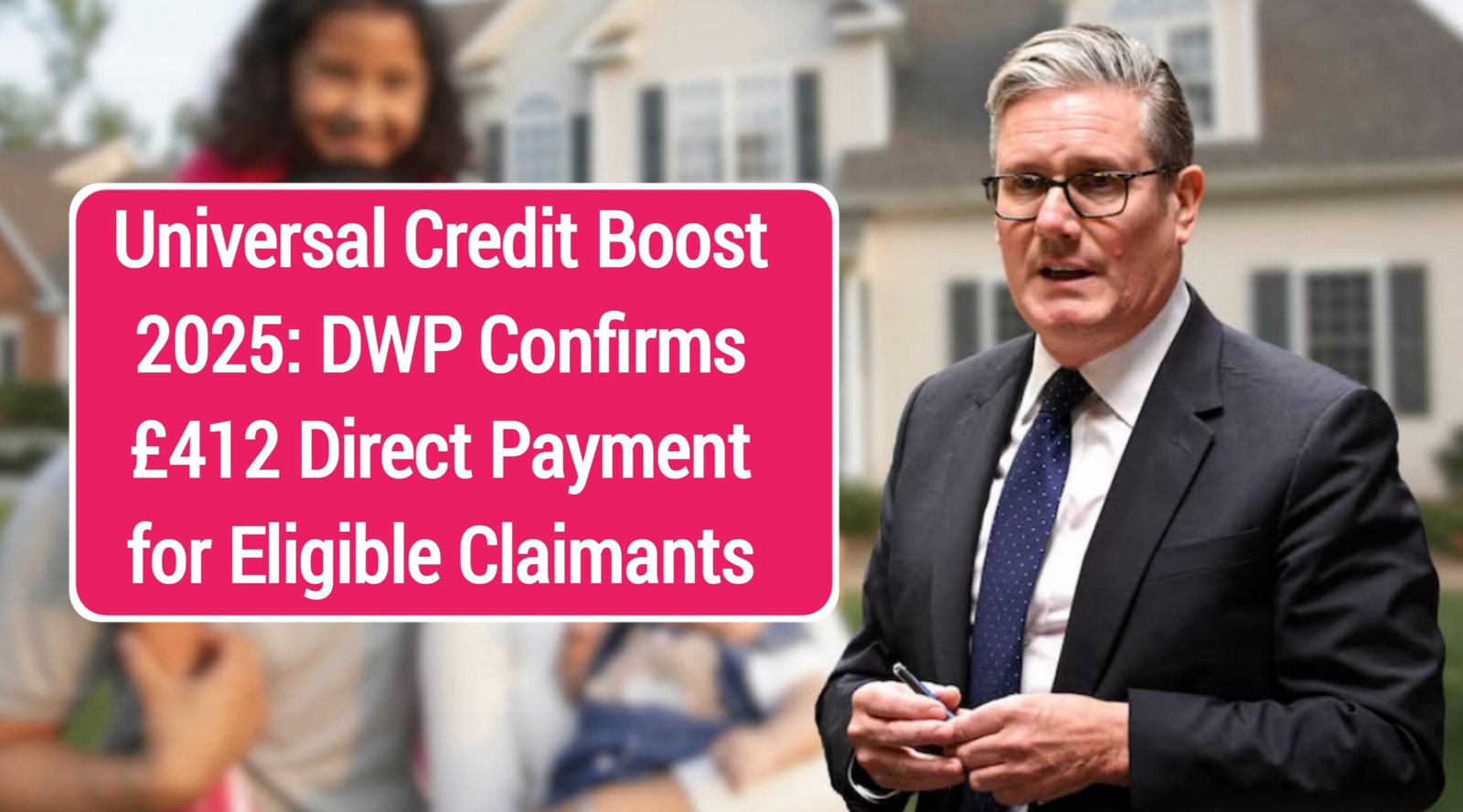The Department for Work and Pensions (DWP) has recently confirmed a significant update for Universal Credit recipients in 2025. Eligible claimants will receive a direct payment of £412, aimed at helping families and individuals manage rising living costs. This boost is part of the government’s ongoing support for low-income households and will impact millions across the UK.
Understanding how and when this payment will be issued is crucial for all claimants. In this article, we break down eligibility, payment schedules, and what this means for Universal Credit recipients.
What is the Universal Credit Boost?
The Universal Credit boost is a one-off or scheduled additional payment added to regular Universal Credit benefits. The DWP introduced this measure to ease financial pressure for households facing inflation, housing costs, and other essential living expenses. For 2025, the confirmed amount of £412 will be paid directly into eligible claimants’ bank accounts.
This boost is designed to complement existing benefits and help bridge the gap between household income and monthly expenses. While the core Universal Credit payment covers basic living costs, this additional support can be crucial for those with unexpected costs or emergencies.
Who is Eligible for the £412 Payment?
Eligibility criteria for the Universal Credit boost are largely based on current Universal Credit claim status. To qualify, claimants must:
- Be actively receiving Universal Credit at the time of payment.
- Meet the DWP’s income and household composition requirements.
- Not have received a similar one-off boost recently.
Households with children, disabled claimants, or those with higher living costs may see additional support beyond this £412. The DWP encourages all claimants to check their Universal Credit account to confirm eligibility.
When Will the Payment Be Issued?
The £412 direct payment is expected to be issued in stages throughout 2025, depending on claimants’ payment schedules. Most payments will be credited directly to the bank accounts linked to the Universal Credit account, avoiding delays caused by manual processing.
Claimants should ensure their bank details are up to date to prevent any disruption. Those who recently changed their account or received a payment failure notice should contact the DWP immediately.
How the Payment is Calculated
The £412 amount is standardized for most claimants, but the final payment may vary depending on household circumstances. For instance, couples claiming Universal Credit jointly may receive a combined payment, while individual claimants will receive the full £412.
Other factors, such as housing costs, childcare support, and additional allowances, do not directly affect this boost. It is intended as a flat-rate payment to support general living expenses.
How to Claim the Boost
Eligible Universal Credit recipients do not need to submit a separate claim for this boost. Payments will be automatically added to regular Universal Credit disbursements. However, claimants should:
- Ensure their Universal Credit account is active and in good standing.
- Verify that personal and bank details are current.
- Monitor their online account for confirmation of the payment.
If any issue arises, the DWP has dedicated support channels for claimants experiencing payment delays.
Impact on Household Finances
This £412 boost can have a meaningful impact on household budgets. Many families report that additional support allows them to cover essential bills, reduce debt, or save for upcoming costs. The payment is particularly beneficial for households facing rising energy bills, rent increases, or childcare expenses.
Experts suggest that timely use of this boost can prevent short-term financial strain and provide a safety net for those managing multiple obligations. While not a permanent solution, it is an important part of the UK’s welfare support system.
Common Questions About the Payment
Will this affect my regular Universal Credit?
No, the boost is separate from your regular monthly payments and will not reduce your standard entitlement.
Do I need to report it on tax returns?
Universal Credit is generally tax-free, and this one-off boost is treated as part of your benefits, so no additional reporting is required.
What if I am new to Universal Credit?
New claimants who meet eligibility criteria will automatically receive the boost after their claim is processed.
DWP Support and Resources
The DWP encourages claimants to use official guidance when planning for this payment. Helpful resources include:
- Universal Credit online account portal
- DWP helpline for claimants
- Local jobcentre offices for in-person support
These resources provide updates on payment dates, eligibility confirmation, and assistance for technical issues.
Planning Ahead for 2025
For claimants relying on Universal Credit, planning around this £412 boost is essential. Budgeting for household expenses, rent, bills, and childcare can be more manageable with the additional payment. Claimants are advised to:
- Allocate the boost toward essential costs first
- Consider using part of the payment for short-term savings or emergency funds
- Stay informed about upcoming benefit updates from the DWP
Conclusion
The 2025 Universal Credit boost of £412 demonstrates the UK government’s commitment to supporting low-income households. By providing direct payments, the DWP aims to reduce financial pressure and help claimants manage everyday expenses more effectively.
Eligible claimants should ensure their Universal Credit accounts are up to date, understand the timing of payments, and use the boost wisely. With proper planning, this additional support can make a significant difference in household finances, offering relief to millions across the UK.
The £412 payment is more than just a number—it represents an important lifeline for many families navigating the challenges of modern living. By staying informed and proactive, claimants can maximize the benefits of this support and plan for a more secure financial future in 2025.
